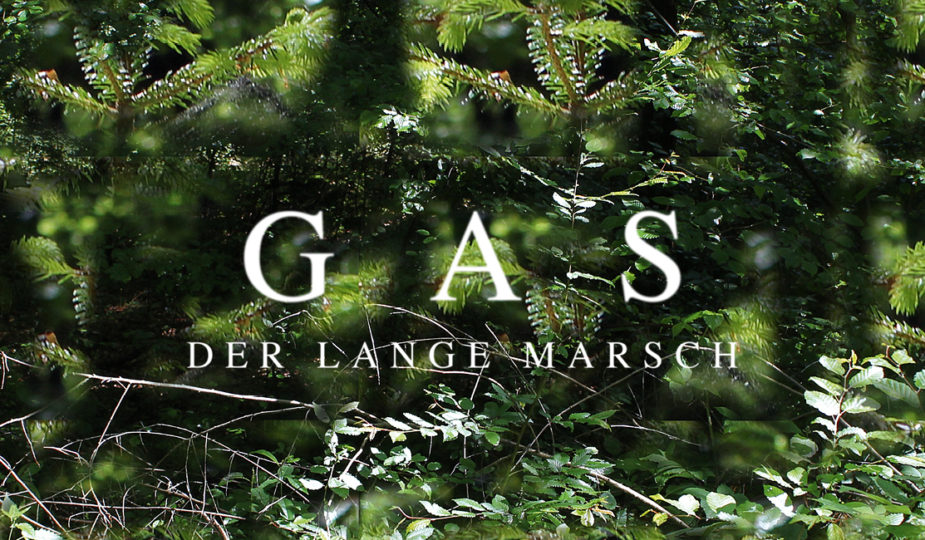
A Darkly Romantic Apocalypse: GAS – Der Lange Marsch (2021)
Do you not then hear this horrible scream all around you that people usually call silence.
Werner Herzog
Anticipations are high when a new GAS record is being released, as they are addictively cinematic and fuel our defrauded cravings for inspiration. Not only does Der Lange Marsch (“The Long March“) not disappoint these anticipations, but it establishes itself as the next highlight in the catalogue of Wolfgang Voigt, who seems to be at the top of his game. While relying on his well-tested recipes for cooking up dark and sinister euphoria, the symphonic alchemist offers us something new and previously under-explored within his work: melancholy, nostalgia, romance. Even touch, even love- albeit in a twisted surrounding. Der Lange Marsch spins in an abnormal, somnambule level of yearning.
While GAS albums are conceptionally set in the German forest, the sound of the newest installment is expanded and at times a strangely oceanic one. Especially during the first half of the continuous record with no track breaks, we are approaching the forest via malevolent Alp villages with rippling streams and the melancholic grandezza of abandoned coastal towns, while all of these settings are embedded in the still waters of modern surfaces, making for the greatest horror of them all.
Starting off with an eerily calm and euphoric beat, the MS Joy is sailing through smooth waves, and only at closer glance we realize that by now it is a ghost ship steered by a single-toothed captain plowing its way through equally faded coastal grandezza before stopping at shores littered with ruins for one final, crude postcard snapshot. There is a complex sense of apocalypse in these tracks which are pulsating through a long forgotten transmitter in a time post-everything. Just tune in Track 4 to 5, a passage that is filled with dark romanticism and an eeriness feeding from its own void. A broken waltz starring Sissi in rotten splendor and algorithmically dancing like a skulled E.T.A Hoffmann automat. With the past grandeur casting faintest shadows that still mercilessly penetrate our contemporary consciousnesses devoid of musing in attention, it is the clumsy and cold-blooded despair and regret they produce which confirms the triumph of the cosmic spark, of love and instinct, in even the most twisted circumstances.
It is after this remarkable passage of Der Lange Marsch where the ghosts of past, present, and future are being released. A heavy drone sprinkled with classic romanticism is the backdrop to the emergence of creatures like Jelinek’s alpine zombies in Children of the Dead (1995) and the embryonic zombies of Metaverse Valley. The former tell the story of past atrocities and destruction, the latter cannot conclude any story coherently due to their glitchy genesis and nature, but push forward mercilessly nevertheless. In between, the many harbingers of destruction- a cacophony of boots squashing the sludge, a muddy and bloody kind of ocean. The devil’s shadow is dancing on your walls now during the second half of the record.
Controversial is the continuous, deliberate tinnitus sound on this GAS album: it sounds like pouring rain or the crackling of a vintage record. It is a perfect sonic realization of crippled nostalgia and decay lingering under the romantic surfaces and connotations, revealing a duality which is also to be found in the forest. Think of Werner Herzog’s visceral writings on nature, which for him is obscene, violent, and indifferent. Or think of the opening shots of Blue Velvet (1986), where Lynch alters the comforting deceptions of dimension when his camera zooms from the clean suburban surface of juicy green lawns into the soil, “Erdreich“ in German: the Reich of the Soil. It is a menacing, babylonian Reich full of violence and mechanically crude parasites.
We may not know what exactly Voigt is conceptualizing and can only subjectively connote while experiencing his music; what we do know is that he not only sets the listener’s thinking and imagination free, but focalizes both almost interactively and composes it all into a perfect soundtrack for our times. His work has a gravity and substance to it that is exceptional for the genre, and all genres.
by Saliha Enzenauer
